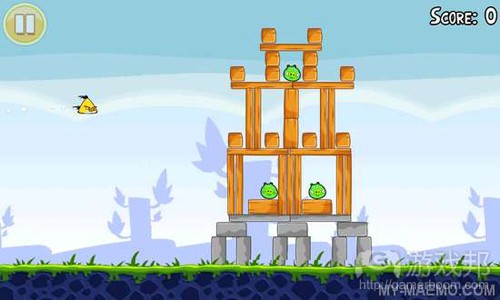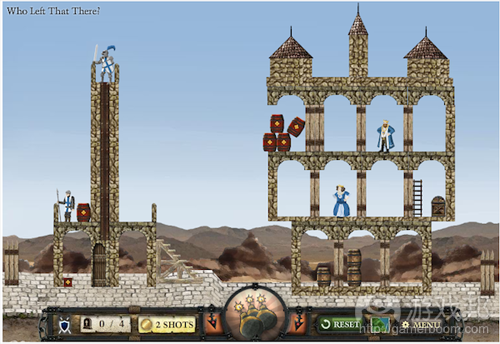《愤怒的小鸟》复制了《城堡粉碎战》游戏理念?
作者:Jeff Wofford
当人们知道我创造了iOS版本的《城堡粉碎战》时,总是会呈现出一种非常吃惊的表情。
他们会问道:“难道你不会因为《愤怒的小鸟》抄袭你的游戏而生气?”
我会老实地告诉他们,我并不生气。
于是他们便会回应道:“真的吗?如果是我就会非常生气。并有可能对他们发起控诉。”
我再次摇了摇头,我们并不打算控诉《愤怒的小鸟》。对此我非常释然。
而今天,我想在此解释为什么我会这么想。
首先我需要澄清的是最初的《城堡粉碎战》并不是我所创造的。我只是代表Armor Games(最早开发了这款游戏的网页版本)创造了iPhone和iPad版本的《城堡粉碎战》。这篇文章仅是我个人的观点——虽然我与Armor Games的工作人员都非常友好,但我却不能代表他们的立场。
对于游戏复制问题我有自己独特的见解。我在1995年便进入了游戏产业,并参与了《网络创世纪》的制作——后来《无尽的任务》复制了这款游戏,《魔兽世界》也呈现出了一些相似的内容。
而最近,我成为了美国南方卫理公会大学的Guildhall教员,在此教授游戏编程与道德。是的,你应该听说过,也就是关于游戏道德的大学课程。所以我对于怎样的“复制行为”是糟糕的,何时又是合理,以及为什么等问题充满了兴趣。
最近,IGN上出现了一篇有关《愤怒的小鸟》复制《城堡粉碎战》的文章。在这篇文章中,他们阐述了一款游戏如果复制了其它游戏便属于不道德行为,但是对于玩家来说这却是件好事,因为这代表着某一创新理念演变成一种类型而存在。从总体上来看,我同意这篇文章的结论,但其某些论点不管是从逻辑上或道德上来看都是不合理的。
何时的复制是不合理的
那篇文章认为玩家不应该在乎开发者何时复制了别人的游戏理念,因为这种复制对于玩家来说是件好事。为什么?因为一款游戏复制了其它游戏的理念便意味着一种游戏类型的萌生。
关于这一论点存在着两个问题。
首先,因为某些对于你来说是有益的事物却不一定是好的。它也许会对别人造成伤害。尽管玩家能从开发者复制别人的理念中获益,但开发者的这种复制行为仍然是不正确的。而这篇文章的态度似乎变成了“尽管开发者这么做是可耻的,但是如果这对我来说是有益的,我干嘛在乎那么多?”这便是不符合道德标准的想法。
第二个问题是,文章认为开发者在复制了别人的游戏理念时,玩家才是最终的赢家。这一问题并非不道德,而是不正确。
当一名游戏开发者的理念遭到别人的复制时,他便算是输家。他投入了时间与血汗而创造出了全新且优秀的内容,但最终却只能看着别人坐享其成。
这时候这位开发者便不再想创造任何新理念了。他会认为赢家是那些利用现有理念,并重新落实行动的人——就像文章中所提到的《Plague,Inc.》vs.《Pandemic 2.5》。尽管《Pandemic》开辟了全新的游戏理念,但是《Plague》(游戏邦注:做出了一些改进,并在一个月后发行的一款类似的游戏)却取得了更棒的销量。如果获胜的关键是复制的话,那谁还会去创造新理念呢?
结果便是越来越少开发者愿意创造新理念,而只是不断推出更多复制游戏。。
为什么创造一种类型是件很棒的事?IGN的那篇文章似乎认为类型是备受追捧的事物——是游戏开发“发展”的硕果。但我却不这么认为。我认为很多时候,类型更像是一种退化——就像是一个愚蠢的懦夫所创造出的无聊且无趣的游戏。
当游戏开发者复制了其他开发者的创造性理念并比后者赚得更多收益时,复制对他们来说便是一种奖励,但是这时候的创造性也被彻底粉碎了。这只会带给玩家不利的影响,因为他们所面对的游戏的创造性受到了约束。如此我们只能听到越来越少“哇!我从未玩过像这样的游戏!”,而听到更多“嗯,他们创造了更炫的枪口”这类型评价。
在任何创造性或技术领域中,创新理念都必须受到保护。这也是为何会出现版权和专利的原因:以此保护那些投入了努力,时间,才能与金钱而创造出全新内容的大胆的思考者。
所以我并不赞同那篇文章所提到的,开发者可以安然无恙地复制别人理念的观点。法律应该约束这种行为,所有玩家也应该谴责这种行为,因为不管是对于开发者还是玩家来说,这种做法都是有害的。
为什么《愤怒的小鸟》并不算真正的复制行为
如果说我认为游戏开发者复制别人的游戏理念是种错误的做法,为什么对于《愤怒的小鸟》复制《城堡粉碎战》我又可以如此释然?
原因很简单,我并不认为《愤怒的小鸟》复制了我们的游戏理念。
不可否认的是,《愤怒的小鸟》利用了《城堡粉碎战》的一些元素。但是这些元素也并非我们原创的。《城堡粉碎战》也模仿了早前的许多游戏。《城堡阻击》便是最显著的例子,但是让玩家猛击建筑的理念则应该追溯到《Rampage》,或其它更早前的游戏。
小时候,我曾与堂兄一起玩过一款游戏,即我们可以使用多米诺骨牌去建造一个临时的城堡。我们可以在城堡中放置一个陆军形体的小人作为“国王”。游戏的目标则是:通过滚动多米诺骨牌去粉碎敌人的城堡。当敌人的国王被推翻时,你便获得了胜利。我还记得那时候应该是20世纪70年代。生活在那个年代的孩子们应该都玩过这款游戏。所以说,不管是《愤怒的小鸟》还是《城堡粉碎战》,它们的游戏理念都不是最新的。
在那之后几年,又有人发行了一款名为《Crossbows and Catapults》的模型游戏。这与我们之前玩的游戏非常相似。而这是否就意味着它窃取了之前游戏的理念?当然不是。只能说它们碰巧拥有了类似的理念罢了。
这便解释了我所坚持的原则——复制别人的理念并没错,但是复制别人的创新理念就大错特错了。
如果一个理念是常见的,或得到确认的,那就尽管复制它。而如果你所面对的是特别且具有创新性的理念,那就不要轻易去碰触它。让那个发现这一理念的人去享受属于自己的荣誉与财富。理念并不稀罕。但只有具有创造性的理念才是真正有价值并值得尊敬的。
所以Rovio从未窃取《城堡粉碎战》的任何创造性理念。他们只是也涉及了早前的摧毁模型的游戏玩法罢了。并且他们出色地执行了这一理念,赋予了游戏更棒的技能和魅力。所以他们才能得到应有的奖励。
现在,如果我们已经创造出了一些真正具有创造性的游戏功能——如有效的触屏操纵杆,或者像《割绳子》与《坎坷之路》那般的创新游戏理念,而其它开发者复制了我们的这一功能并做出了一些修改,那么我的态度便不会是这样的了。因为这么做不仅会伤害我们的利益,同时也将给玩家造成不利影响。这种复制行为必须得到遏制。但《愤怒的小鸟》的行为却完全不同。
我们都知道,《愤怒的小鸟》取得了非常惊人的成绩,但《城堡粉碎战》也不赖。我们也获得了上百万的下载量,并曾在App Store中高居榜首。《城堡粉碎战》同时造福于创造者和玩家。所以我不认为《愤怒的小鸟》对其带来了哪种伤害。
我并不想去控诉他们。我真心恭喜他们所获得的每次成功。实际上,我曾与《愤怒的小鸟》的一名程序员Jani Kajala一起工作过。他真的是个很棒的人,也是一名非常出色的程序员。我从未想过在背后踹他一脚。
同时我也并不嫉妒《愤怒的小鸟》。与我们一样,他们也是借着同样的动力而飞起来,虽然不得不承认,他们飞得更高。而这又有什么值得生气的呢?
游戏邦注:原文发表于2012年6月21日,所涉事件和数据均以当时为准。(本文为游戏邦/gamerboom.com编译,拒绝任何不保留版权的转载,如需转载请联系:游戏邦)
Angry Birds “Cloned” Crush the Castle, and That’s Okay
By Jeff Wofford
When people find out that I developed the iOS version of Crush the Castle, they often respond in a peculiar and surprising way. They come to my defense.
“Man, aren’t you angry that Angry Birds ripped you off?” they ask. “They totally stole your idea.”
I tell them, no, I’m not angry
“Really?” they reply. “I would be. I would totally sue those bastards.”
And I say, no, we’re not going to sue Angry Birds. I’m fine with it. It’s cool.
Today I want to explain why I’m cool with it and why you should be too.
Let me first mention that I didn’t develop the original Crush the Castle. I created the iPhone and iPad versions on behalf of Armor Games, who had originally developed the game for the web. I’m only part of the Crush the Castle story. This post is my opinion only—I’m good friends with the Armor Games guys, but I don’t speak for them.
I think I do have a unique take on the game-cloning issue. I’ve been in the games industry since 1995. I helped build Ultima Online, a game that was later “cloned” by Everquest and ultimately, perhaps sorta kinda, by World of Warcraft. (Yes I’m hereby staking my claim on 0.000001% credit for World of Warcraft’s success, a credit still worth about a million dollars.) More recently I’ve joined the faculty of the Guildhall at SMU, where I teach game programming and Ethics. Yes, you heard me right: a university course on the ethics of games. So I’m interested in the question of what kind of “cloning” is the bad kind and when and why it’s okay.
IGN recently mentioned the cloning of Crush the Castle by Angry Birds. In the article they argue that games copying other games may be unethical, but it is good for gamers because it represents the evolution of innovative ideas into genres. On the whole I accept the article’s conclusions, but some parts of the argument are logically and ethically weak.
When it’s Not Okay to Steal
The article argues that gamers shouldn’t care when developers rip off other developer’s ideas, because ripping off is good for gamers. How so, you ask? The article answers: because games stealing other games’ ideas is how genres are born.
There are two problems with this argument.
First, just because something is good for you doesn’t make it good. If it hurts someone else, you should be concerned. Even if gamers benefited when developers steal other developers’ ideas, it would still be wrong for developers to do it. The article’s attitude seems to be, “It’s nasty when developers do that, but it’s good for me, so who cares?” This is unethical thinking.
The second problem with the article is its suggestion that gamers win when developers steal. This isn’t unethical—just untrue.
When a game developer has an idea stolen, that game developer loses. They’ve spent extra time, extra sweat and blood, to create something new and beautiful, only to see someone else get the money and the glory.
This developer then has less incentive to develop new, innovative ideas. They see that the winners are the ones that take existing ideas and re-implement them—like the case of Plague, Inc. versus Pandemic 2.5 that is highlighted in the article. Pandemic developed the idea, but Plague—a closely similar game with subtle improvements that was released a month later—has sold vastly more copies. If the way to win is to steal, why build anything new?
The result is that developers produce fewer and fewer innovative concepts and create more and more copy-cat games. Before too long, yes indeed, you’ve got yourself a “genre.”
But why is creating a genre such a wonderful thing? The IGN article seems to think that genres are the bees’ knees—the lush fruit of game development “evolution.” That’s not clear to me. To me a genre often looks like a devolution—a logjam of simpering cowards making boring and uninteresting games.
When game developers copy other developers’ innovative concepts and make more money than the original developer, stealing is rewarded and innovation crushed. This hurts players because it limits the creativity of the games we play. We find fewer and fewer “Wow! I’ve never seen anything quite like that before!” moments in our games, and more and more “Hm, they’ve made the muzzle flash slightly brighter” moments.
In any creative or technical field, innovation must be protected. It’s the reason (or used to be the reason) why we have copyrights and patents: to protect those daring thinkers who spend the effort, time, talent, and money to create the truly new.
So I disagree with the article’s implication that game developers should be allowed to steal each others ideas with impunity. The law should protect against this, and all gamers should decry it, because it harms both developers and players.
I wondered how the writer of the article would feel about having his hard work stolen, so I went ahead and stole his article. Don’t worry—I changed a few things. That makes it okay.
Why Angry Birds Didn’t Really Steal
So if I think it’s wrong and harmful for game developers to steal each others’ ideas, why am I cool with Angry Birds stealing Crush the Castle’s ideas?
The reason is simple. I don’t think Angry Birds stole our ideas.
Sure, Angry Birds took elements from Crush the Castle. But those elements were hardly novel or innovative. Crush the Castle borrowed from many previous games. Castle Clout is the most obvious example (obvious because the Crush the Castle credits give them a shout-out), but the general idea of allowing the user to smash buildings dates back to Rampage or even earlier.
When I was a kid, my cousin and I would play a game in which each of us would use dominoes to construct a makeshift castle. We’d place an army figure inside the castle as the “king”. The goal: smash your opponent’s castle by sliding a domino into it. When the enemy’s king topples, you win. We were playing this game in the 1970s. No doubt many other kids have had the same idea through the centuries. So the idea behind Angry Birds and Crush the Castle is hardly new.
A few years after this misspent childhood, someone published a physical game called Crossbows and Catapults. It was pretty much the same thing we had been playing. Did they steal our idea? Of course not. They just stumbled across the same concept on their own.
This illustrates the principle I’ve been driving at.
It’s okay to steal a game’s ideas. It’s wrong to steal their innovative ideas.
If an idea is obvious, commonplace or well-established, then it’s fair game. Steal it. If it’s non-obvious, if it’s innovative, if it took work or insight or luck to discover, then keep your filthy hands off it. Let the one who found it enjoy the credit and wealth. Ideas are a dime a dozen. Innovative ideas are valuable and should be honored.
Rovio (the developers of Angry Birds) didn’t take anything innovative from Crush the Castle. They tapped into a broad, rich, ancient tradition of physics-based structure-crushing play. They implemented it well, with skill and charm. And they reaped the rewards fairly.
Now if we had created some truly innovative gameplay feature—a touchscreen joystick implementation that doesn’t suck, for example, or a novel game concept like Cut the Rope or Bumpy Road—and they had reimplemented the exact same feature with minimal modification, that would be different. Them would be fightin’ words. That would harm us and it would harm players. That kind of cloning needs to be hated and stopped. But that’s not the kind of cloning Angry Birds carried out.
And you know, Angry Birds is an incredible phenomenon, but Crush the Castle is a hit, too. We’ve had millions of downloads, we’ve topped the App Store charts. (You should go buy it for your iPhone. There’s an iPad version too.) Crush the Castle has served its makers and players well. I don’t believe Angry Birds did anything to harm that.
No, I don’t feel like suing them. I wish them every success. In fact—hardly anybody knows this—I actually work with one of the Angry Birds programmers, Jani Kajala. He’s a nice guy and an awesome programmer. I hardly ever punch him in the face.
I don’t begrudge Angry Birds. They simply flew in the same breeze for a while, rode the same thermal up to the heavens, though admittedly higher than us. Still, what’s to be angry about?(source:jeffwofford)









































 闽公网安备35020302001549号
闽公网安备35020302001549号